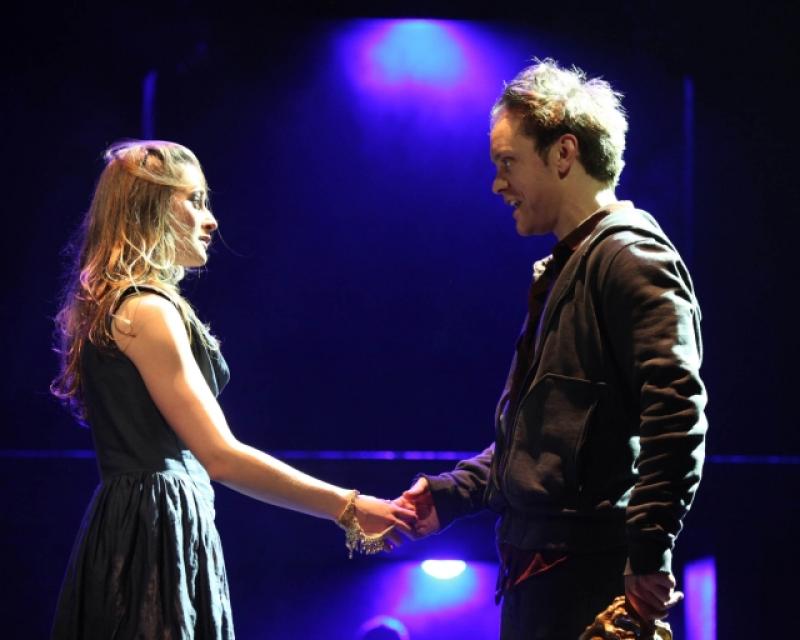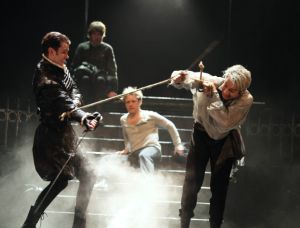Romeo and Juliet, RSC/Roundhouse | reviews, news & interviews
Romeo and Juliet, RSC/Roundhouse
Romeo and Juliet, RSC/Roundhouse
Shakespeare ensemble's London return makes stars of two star-crossed lovers

Can you go home again? That's the question that will be hanging over the Royal Shakespeare Company's first residency at the Roundhouse since their "History Play" cycle stormed north London over two years ago, reminding those lucky enough to catch it of the loss to the capital ever since the RSC opted out of a London base of operations.
The happy news is that Rupert Goold's transfer of his Romeo and Juliet, first seen in Stratford-upon-Avon this past March, boasts two truly thrilling performances from Sam Troughton and Mariah Gale in the title roles, which are here taken with a singular ferocity and intelligence not encountered in this play in some time. And if some of the directorial flourishes are either silly or unnecessary, in turn allowing for the odd supporting performance or two whose eccentricities quickly pall, all cavils fall away faced with the central players. The ongoing interest, of course, will lie in seeing how the other stagings stack up (Antony and Cleopatra, starring Kathryn Hunter, is up next), not to mention how the productions fare upon transferring to New York next summer.
You'll doubtless have heard by now of Goold's conceit, which is to dress his titular duo in contemporary garb (a hoodie for him, jeans and trainers for her), keeping the rest of the ensemble in period dress up until a grievous finale that finds the entire assemblage attired as if for the here and now, so as to speak to an age that understands Shakespeare's tale of tribal warfare with or without West Side Story or the likes of Baz Luhrmann to move the references on. Romeo starts the play tapping into Shakespeare's Prologue via an audio guide and, later, whizzes on and off by means of a bicycle: precisely the sorts of Goold-isms that will in no way surprise followers of this director over the years.
What is startling is the joint reinvention of both leading roles, starting with Troughton's appealing, likeable Romeo, a young swain miles removed from the decidedly wet egotist that this part has become over time - not least because Romeo is quite possibly the greatest solipsist of any Shakespeare lover. (Even in death, his final words read: "Thus with a kiss I die." That's to say, Juliet who?) Gale, blessed with easily the richer part, is a genuine sensation, a child-woman who visibly matures over the course of three-plus hours - so much for the "two hours' traffic of our stage" erroneously promised by the author - on the way to a reckoning with her actual groom, namely death, that seems ripped from far within the gut. Rarely have I felt Juliet's world so fully closing down around her - one, she informs us, "past hope, past care, past help", whereby suicide comes to seem her only source of empowerment.
 I could have done without Forbes Masson's effortful Friar Laurence, the open-toed sandals suggesting a refugee from Godspell, and Jonjo O'Neill (pictured right in duelling mode) makes a flouncy, irksome hash out of the foolproof (or so one has always thought) role of Mercutio, the Queen Mab speech here so mannered that a paean to poetic invention and linguistic extravagance becomes an invitation to switch off. The physical production, too, could tone down the lapping flames that project a Hammer Horror feel on to Tom Scutt's multileveled design, Howard Harrison's funereal lighting doubtless taking its cue from the Prince's closing adjective, "glooming", that I have yet to encounter elsewhere.
I could have done without Forbes Masson's effortful Friar Laurence, the open-toed sandals suggesting a refugee from Godspell, and Jonjo O'Neill (pictured right in duelling mode) makes a flouncy, irksome hash out of the foolproof (or so one has always thought) role of Mercutio, the Queen Mab speech here so mannered that a paean to poetic invention and linguistic extravagance becomes an invitation to switch off. The physical production, too, could tone down the lapping flames that project a Hammer Horror feel on to Tom Scutt's multileveled design, Howard Harrison's funereal lighting doubtless taking its cue from the Prince's closing adjective, "glooming", that I have yet to encounter elsewhere.
And yet, the staging is smart where it counts most and sustains interest in a time-honoured text that remains far more robust, dense and deeply nihilistic than Romeo and Juliet is often credited with being. ("Leave me to myself tonight," requests Juliet, as if solitude were in fact her default state of being.) Perhaps the ultimate accolade rests with the held silence - an idiot nut-chomper over the aisle from me notwithstanding - with which a noticeably young audience lapped up proceedings throughout. In the end, it's as if Shakespeare trumps any trickery Goold can throw at him, leaving the play to hurtle ever-forward towards its characters' collective date with destiny. Death, where is thy sting? For the next month or so, look no further than the Roundhouse.
Share this article
Add comment
The future of Arts Journalism
You can stop theartsdesk.com closing!
We urgently need financing to survive. Our fundraising drive has thus far raised £49,000 but we need to reach £100,000 or we will be forced to close. Please contribute here: https://gofund.me/c3f6033d
And if you can forward this information to anyone who might assist, we’d be grateful.

Subscribe to theartsdesk.com
Thank you for continuing to read our work on theartsdesk.com. For unlimited access to every article in its entirety, including our archive of more than 15,000 pieces, we're asking for £5 per month or £40 per year. We feel it's a very good deal, and hope you do too.
To take a subscription now simply click here.
And if you're looking for that extra gift for a friend or family member, why not treat them to a theartsdesk.com gift subscription?
more Theatre
 The Line of Beauty, Almeida Theatre review - the 80s revisited in theatrically ravishing form
Alan Hollinghurst novel is cunningly filleted, very finely acted
The Line of Beauty, Almeida Theatre review - the 80s revisited in theatrically ravishing form
Alan Hollinghurst novel is cunningly filleted, very finely acted
 Wendy & Peter Pan, Barbican Theatre review - mixed bag of panto and comic play, turned up to 11
The RSC adaptation is aimed at children, though all will thrill to its spectacle
Wendy & Peter Pan, Barbican Theatre review - mixed bag of panto and comic play, turned up to 11
The RSC adaptation is aimed at children, though all will thrill to its spectacle
 Hedda, Orange Tree Theatre review - a monument reimagined, perhaps even improved
Scandinavian masterpiece transplanted into a London reeling from the ravages of war
Hedda, Orange Tree Theatre review - a monument reimagined, perhaps even improved
Scandinavian masterpiece transplanted into a London reeling from the ravages of war
 The Assembled Parties, Hampstead review - a rarity, a well-made play delivered straight
Witty but poignant tribute to the strength of family ties as all around disintegrates
The Assembled Parties, Hampstead review - a rarity, a well-made play delivered straight
Witty but poignant tribute to the strength of family ties as all around disintegrates
 Mary Page Marlowe, Old Vic review - a starry portrait of a splintered life
Tracy Letts's Off Broadway play makes a shimmeringly powerful London debut
Mary Page Marlowe, Old Vic review - a starry portrait of a splintered life
Tracy Letts's Off Broadway play makes a shimmeringly powerful London debut
 Little Brother, Soho Theatre review - light, bright but emotionally true
This Verity Bargate Award-winning dramedy is entertaining as well as thought provoking
Little Brother, Soho Theatre review - light, bright but emotionally true
This Verity Bargate Award-winning dramedy is entertaining as well as thought provoking
 The Unbelievers, Royal Court Theatre - grimly compelling, powerfully performed
Nick Payne's new play is amongst his best
The Unbelievers, Royal Court Theatre - grimly compelling, powerfully performed
Nick Payne's new play is amongst his best
 The Maids, Donmar Warehouse review - vibrant cast lost in a spectacular-looking fever dream
Kip Williams revises Genet, with little gained in the update except eye-popping visuals
The Maids, Donmar Warehouse review - vibrant cast lost in a spectacular-looking fever dream
Kip Williams revises Genet, with little gained in the update except eye-popping visuals
 Ragdoll, Jermyn Street Theatre review - compelling and emotionally truthful
Katherine Moar returns with a Patty Hearst-inspired follow up to her debut hit 'Farm Hall'
Ragdoll, Jermyn Street Theatre review - compelling and emotionally truthful
Katherine Moar returns with a Patty Hearst-inspired follow up to her debut hit 'Farm Hall'
 Troilus and Cressida, Globe Theatre review - a 'problem play' with added problems
Raucous and carnivalesque, but also ugly and incomprehensible
Troilus and Cressida, Globe Theatre review - a 'problem play' with added problems
Raucous and carnivalesque, but also ugly and incomprehensible
 Clarkston, Trafalgar Theatre review - two lads on a road to nowhere
Netflix star, Joe Locke, is the selling point of a production that needs one
Clarkston, Trafalgar Theatre review - two lads on a road to nowhere
Netflix star, Joe Locke, is the selling point of a production that needs one
 Ghost Stories, Peacock Theatre review - spirited staging but short on scares
Impressive spectacle saves an ageing show in an unsuitable venue
Ghost Stories, Peacock Theatre review - spirited staging but short on scares
Impressive spectacle saves an ageing show in an unsuitable venue

Comments
...